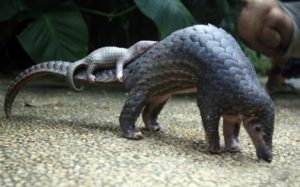Wild Africa Fund on Friday, May 19, 2023, launched a campaign to raise awareness about the threats facing endangered species in Nigeria.

The non-profit called on Nigerians to protect Nigeria’s endangered species while urging the federal government to pass the Endangered Species Conservation and Protection Bill as the world marks Endangered Species Day, an annual event to celebrate and take action to protect threatened and endangered species.
Nigeria is home to numerous wild animals such as pangolins, lions, chimpanzees, elephants, gorillas, vultures, manatees, and parrots. But these animals are now endangered and at risk of extinction due to poaching for bushmeat consumption and illegal wildlife trade and habitat destruction.
These animals now categorised in the International Union for Conservation of Nature (IUCN)’s Red List of Threatened Species are also threatened by deforestation and illegal logging due to encroachment by local communities for agricultural expansion.
When wild animals are endangered, it means only a few of them are left in the wild and the continued threats to these species will further reduce the animal population or make them become extinct in the near future while negatively impacting biodiversity and destroying the ecosystem.
“Our iconic giraffes, rhinos, and cheetahs have already gone into extinction due to illegal wildlife activities. It will be disastrous for Nigeria to lose its remaining endangered animals,” says Wild Africa Fund Nigeria Representative, Kelechukwu Iruoma.
These endangered species play significant roles in preserving the ecosystem. Pangolins, for example, consume about 70 million insects in a year to regulate the insect population numbers so that crops can grow.
“Only strong laws and enforcement can protect our endangered species and make Nigeria number one in wildlife conservation in West Africa.”
Wild Africa Fund commends the Federal High Court’s conviction and sentencing of two Nigerians to four years imprisonment for conspiracy and unlawful possession of 839.4kg of pangolin scales and 145 kg of elephant tusks after pleading guilty to the charges brought against them by the Nigeria Customs Services (NCS).
Founder Peter Knights, OBE, congratulates the Nigeria Customs Service and the prosecutors for this historic conviction and urges them to continue the great work to bring an end to all forms of wildlife crime in Nigeria.
“We hope this signals a new era for Nigeria to become the regional leader in policing and prosecuting wildlife crime,” says Knights.
Wild Africa Fund hopes the Endangered Species Conservation and Protection Bill will be signed into law to combat wildlife and forest crime in Nigeria.
“This will go a long way in strengthening enforcement and prosecution of wildlife trafficking offenders and put an end to the illegal killing of Nigeria’s wildlife,” Iruoma said.
Wild Africa Fund is also calling on all Nigerians to “Say No to Illegal Bushmeat,” as a way to ease some of the pressures on endangered species in the country.
Endangered Species in Nigeria are listed to include: Pangolins, Lions, Elephant, Cross River gorilla, Nigeria-Cameroon Chimpanzee, Leopards, African grey parrot, African wild dog, Olive Colobus, Red Colobus and West African Manatees.
Others are Dema gazelle, White throated guenon, Sclater’s guenon, Pygmy hippopotamus, Drill monkey, West African giraffe, Martial eagle, White backed vulture, Hooded vulture, and Ibadan malimbe.
According to Iruoma, Wild Africa Fund employs mass communications such as the “Music for Wildlife” and “Poaching steals from us all” campaigns to change attitudes to poaching, habitat loss and human wildlife conflict.
“Wild Africa Fund also promotes wildlife tourism and carbon offset as a new source of conservation and sustainable development funding. It also promotes and directly supports local wildlife programs from offices in Cape Town, Lagos and Kigali and runs the programmes previously under WildAid in South Africa, Nigeria and Zimbabwe,” he added.
